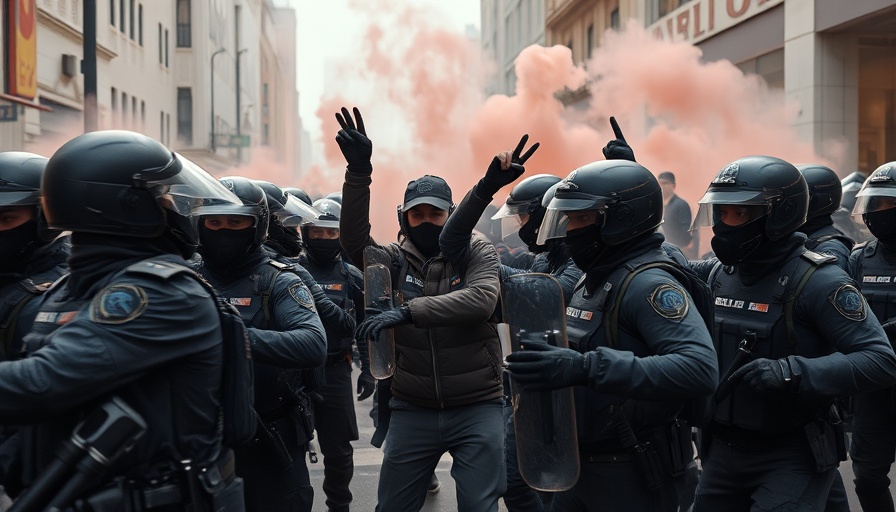
The Rising Tides of Protest in Los Angeles
Amidst the ongoing social upheaval surrounding immigration policies, President Trump has made a decisive move by authorizing the deployment of an additional 2,000 National Guard members to Los Angeles. This action comes in the wake of escalating protests across the city, focused largely on federal immigration raids that have led to the arrests of dozens of individuals. With an active duty status now in place for these troops, many local leaders and officials are voicing their concerns over the potential ramifications of such a forceful presence during a time of dissent.
Reactions from Local Leaders
California Governor Gavin Newsom has called Trump's decision "reckless," describing it as an effort to project power rather than genuinely enhance public safety. Through a post on X, he voiced his fears that this deployment might indeed serve to fuel tensions rather than quell them. Such sentiments are echoed by Los Angeles Police Chief Jim McDonnell, who highlighted the significant logistical challenges posed by this sudden influx of military personnel without proper coordination with the police department.
A Look at the Protests Throughout the City
The protests in Los Angeles have been marked by both peaceful demonstrations and instances of unrest. Following federal immigration authorities' arrests of more than 40 individuals in a single day, crowds have gathered in downtown Los Angeles to express their outrage. The chaos of burning vehicles and the police response—with tear gas and rubber bullets—has led to heightened tensions. The juxtaposition of a heavy law enforcement presence with the voice of the community presents a complex picture reflective of larger national discussions on immigration policy.
The Role of Local and Federal Authorities
As protests continue, the authority of local governance is being put to the test. California Attorney General Rob Bonta has launched a lawsuit against the Trump administration over the guard's deployment, arguing that it violates state sovereignty and constitutes an abuse of presidential power. Such legal challenges highlight the ongoing dispute between state and federal priorities concerning law enforcement and immigration enforcement.
National Guard Versus Community Response
The deployment of National Guard members raises important questions about community safety versus the military's role in civilian settings. As tensions escalate, protesters are questioning whether military intervention is necessary or if it exacerbates violence and frustration within the community. These questions are crucial, as they touch directly on the heart of civic engagement and the rights of citizens to protest peacefully.
Future Predictions: Where Do We Go From Here?
Given the current trajectory, Los Angeles is likely to see continued unrest until policies on immigration are adequately addressed. With upcoming court proceedings surrounding the legality of National Guard mobilization, the state's relationship with the federal government will be pivotal in determining how such events unfold. The implications may reach far beyond California, influencing national policies and public perceptions about immigration and civil rights.
Historical Context: Lessons from the Past
This situation is not without historical precedence. Throughout U.S. history, the National Guard and military have been deployed in civilian contexts, often amid civil disturbances. The outcomes have varied significantly, with some interventions resulting in peaceful resolutions, while others have led to tragic confrontations. Understanding this history is essential for framing current actions and anticipating their consequences.
Taking Action: Civic Engagement Is Key
For local citizens, being informed and engaged is more important than ever. Attending town hall meetings, contacting representatives, and participating in peaceful demonstrations are ways to ensure voices are heard in the decision-making processes that affect communities. As civic-minded residents of Pittsburgh, these citizens can model the importance of active participation in democracy—advocating for community-focused policies rather than militarized responses to civil dissent.
In a time when state versus federal authority is a central issue, it is vital for local citizens to stay informed on immigrant rights and the implications of military presence in urban areas. Knowing one’s rights, advocating for peaceful dialogue, and supporting community initiatives can help pave the way for a better future.
Join the conversation and take action by attending your local civic events or reaching out to officials about your concerns regarding military involvement in civil matters. Engage with community-driven organizations working toward inclusive and fair immigration policies, ensuring the voices of all residents are represented.
 Add Row
Add Row  Add
Add 



Write A Comment